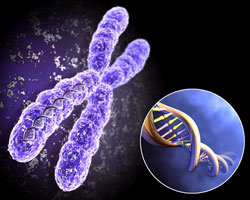Causes of Heart Defects
The main causes that contribute to the development of congenital heart disease are:
- Genetic factors
- Environmental factors
In most cases, however, the disorder is caused by the combination of both genetic and environmental factors.
Genetic Factors

Many forms of congenital heart disease are usually caused by:
- Sporadic genetic changes – they include focal mutations, deletion, or addition of DNA segments. Sporadic means that these changes donot have a certain pattern and cannot be attributed to anything.
- Large chromosomal abnormalities are responsible for about 5-8% of congenital heart diseases.
They include:
o Trisomy 21 – more commonly known as Down’s syndrome. This genetic disorder is the most common among other large chromosomal abnormalities. Around 40% of newborns with Down’s syndrome have congenital heart disease usually in the form of either ventricular septal defect or atrioventricular septal defect. With age, the majority of people with Down’s syndrome develop mitral valve problems, even if everything was fine at birth. In rarer cases, babies with Down’s syndrome may be born with patent ductus arteriosus or tetralogy of Fallot.
o Trisomy 13 – Patau syndrome. Children with Patau syndrome are usually born with ventricular or atrial septal defects. Patent ductus arteriosus (a condition during which a fetal opening between aorta and pulmonary artery is not closed at birth) is also common.
o Trisomy 18 – Edwards syndrome. Similarly to conditions described above, Edwards syndrome causes patent ductus arteriosus, as well as ventricular and atrial septal defects.
- Small chromosomal abnormalities may also lead to congenital heart disease. They include:
o DiGeorge syndrome – about 40% of babies with DiGeorge syndrome are born with a congenital heart disease, which includes interrupted aortic arch, tetralogy of Fallot, persistent truncus arteriosus, and ventricular septal defect.
o 1q21.1 deletion syndrome – 30% of babies with this syndrome have cardiovascular anomalies, including defects of the coronary artery.
o 8p.23.1 duplication syndrome – is responsible for atrial and ventricular septal defects.
There are many other rare genetic disorders that can lead to congenital heart disease. Additionally, scientists have a lot more to discover on the complex development sequence of the heart regulated by the genes.
Environmental factors

Environmental factors influence the embryo during its antenatal development, as it gestates during pregnancy. These factors include:
- Maternal diabetes. Mothers who have diabetes are 5 times more likely to give birth to a baby with some form of heart anomaly. Thus, about 3-6% of these women will give birth to a child with a heart defect (transposition of the great arteries is the most common defect). This risk applies to type 1 and type 2 diabetes. It doesnot apply, however, to gestational diabetes (diabetes that develops during pregnancy and disappears once the woman gives birth). The cause is thought to be high levels of insulin within the mother’s blood. This hormone can interfere with proper development of the fetus.
- Alcohol. Alcohol is a very toxic substance that can damage the tissues of the fetus. If the mother drinks alcohol during pregnancy it can lead to fetal alcohol syndrome. Approximately 50% of children born with fetal alcohol syndrome also have congenital heart disease. Atrial septal defect is the most common defect caused by the fetal alcohol syndrome.
- Rubella. This is a viral infection that is usually well tolerated by children and adults. However, this disease can by devastating or fatal for the baby if the mother was infected by it during the first 8-10 weeks of pregnancy. Due to this, all young women should be vaccinated against rubella if it wasnot performed as a part of routine childhood vaccination schedule.
- Flu. Mothers who catch the flu during the first three months of pregnancy become twice as likely to have a baby with a heart defect. Therefore, flu vaccine is recommended for all women who are pregnant.
- Medications. There is a number of medications that cause malformations of the fetus, most notable of them are:
o Anti-seizure medications including lithium and benzodiazepines.
o Acne treatment including topical retinoid and isotretinoin (known as Accutane).
o Ibuprofen is a common Nonsteroidal Anti-inflammatory drug which can be taken orally or used topically. Women who use Ibuprofen during the first 3 months of pregnancy are two times more likely to have a child born with congenital heart disease.
- Phenylketonuria. This is a congenital genetic disorder which makes the person unable to metabolize phenylalanine (one of the essential amino acids). Therefore people with this disorder have to eat food which does not contain this amino acid. Women with phenylketonuria are approximately 6 times more likely to have a child with congenital heart disease.
- Organic solvents. Women who frequently come in contact with organic solvents are 3 times as likely to have a child with a heart defect. Organic solvents are often found in glue, nail polish, and paint.
Next Chapter: Symptoms of Congenital Heart defects









